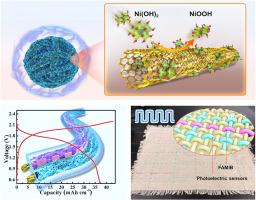Modulating selective interaction of NiOOH with Mg ions for high-performance aqueous batteries
IF 36.6
Q1 ELECTROCHEMISTRY
引用次数: 0
Abstract
Aqueous Mg-ion batteries (AMIBs) featuring advantages of good safety, low cost, and high specific energy have been recognized as a promising energy-storage technology. However, the performance of AMIBs is consistently limited by sluggish diffusion kinetics and structural degradation of cathode materials arising from the strong electrostatic interactions between high-charge-density Mg2+ and host materials. Here, layered-structured NiOOH, as traditional cathodes for alkaline batteries, is initially demonstrated to realize proton-assisted Mg-(de)intercalation chemistry with a high discharge platform (0.57 V) in neutral aqueous electrolytes. Benefiting from the unique core/shell structure, the resulting NiOOH/CNT cathodes achieve a high capacity of 122.5 mAh g−1 and long cycle stability. Further theoretical calculations reveal that the binding energy of hydrated Mg2+ is higher than that of Mg2+ with NiOOH, resulting in that Mg2+ is easily intercalated/de-intercalated into/from NiOOH. Benefiting from the freestanding design, the assembled fiber-shaped “rocking-chair” NaTi2(PO4)3//NiOOH AMIB shows a high energy density and satisfactory mechanical flexibility, which could be woven into a commercial fabric and power for fiber-shaped photoelectric sensors.

调节 NiOOH 与镁离子的选择性相互作用,实现高性能水性电池
水基镁离子电池(AMIBs)具有安全性好、成本低和比能量高等优点,已被公认为是一种前景广阔的储能技术。然而,由于高电荷密度的镁与宿主材料之间存在强烈的静电相互作用,阴极材料的扩散动力学迟缓和结构退化始终限制着 AMIB 的性能。在这里,分层结构的 NiOOH 作为碱性电池的传统阴极,被初步证明可以在中性水电解质中实现质子辅助镁(脱)插层化学,并具有较高的放电平台(0.57 V)。得益于独特的核/壳结构,所制备的 NiOOH/CNT 阴极实现了 122.5 mAh g 的高容量和长周期稳定性。进一步的理论计算表明,水合镁的结合能高于镁与 NiOOH 的结合能,因此镁很容易插层到 NiOOH 中或从 NiOOH 中脱插层出来。得益于独立式设计,组装好的纤维状 "摇椅 "NaTi(PO)//NiOOH AMIB 显示出较高的能量密度和令人满意的机械柔韧性,可编织成商业织物并用于纤维状光电传感器。
本文章由计算机程序翻译,如有差异,请以英文原文为准。
求助全文
约1分钟内获得全文
求助全文

 求助内容:
求助内容: 应助结果提醒方式:
应助结果提醒方式:


